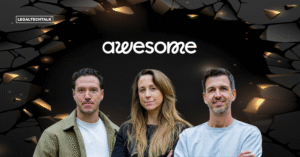In this interview, Jenny Luckham, an experienced in-house legal professional, shares insightful perspectives on the challenges facing legal teams and the characteristics required to thrive during uncertain times. She highlights the pressure to do more with fewer resources and the need to adapt to changing business environments.
Jenny emphasises the importance of building strong relationships within the organisation, leveraging commercial acumen, and adding value beyond traditional legal work. She also stresses the significance of adaptability, simplifying processes, and utilising the full suite of skills and personalities within legal teams.
Additionally, Jenny discusses the importance of maintaining focus and teamwork during times of change while allowing for flexibility and embracing collaboration tools to ensure successful implementation.
Merlin Beyts: What do you think is the biggest change affecting in-house legal teams right now?
Jenny Luckham: As ever, costs and pressure to do more, faster, with less. The business environment is currently uncertain. Payments are taking longer from customers, and businesses are becoming more risk-averse in order to protect themselves. This is certainly being reflected in in-house legal teams, whereby big decisions on hiring, implementation of tech, or external investments are being paused, all of which have a negative knock-on effect. This may leave teams uncertain, under-resourced, or finding it hard to plan.
Also, the last few years of change have changed the type of work an in-house lawyer may perform. Legal teams need to harness their commercial acumen and influence to work with their business to shift bottlenecks, add value, and ultimately become a true business partner in order to assist in the efficiency of an organisation. Adaptability is key in order to thrive both as an individual and as a team.
I’d also add that there is a lot of pressure at the moment to implement legal tech. Given stretched budgets and lack of time, this can be desirable but tricky to action. I would urge teams to focus on what tech they already have in-house and can adapt and understand what their business needs really are before taking the plunge. The products out there are undoubtedly fantastic, but not every organisation really needs all the features at once.
Merlin Beyts: There are both internal and external pressures facing every organisation right now. What are the characteristics of legal professionals who will thrive in this difficult period?
Jenny Luckham: In trying times, the real skill comes in, building and maintaining relationships within your organisation. This is not just with key senior stakeholders but also junior members of staff too. By building these strong relationships, legal professionals can understand what the business’ main issues are and what drives individuals at every level, allowing for the delivery of real value add, even if it isn’t what individuals may think as stereotypical legal work.
Some of the biggest success stories I’ve had are in lightening the business’ load, whether that is through simplifying a process or working with teams to understand risk and amend ways of working to reflect that. A great example was streamlining Ascential’s process to contract in tech procurement and M&A so that parties were clear where responsibilities lay at every stage. This simply reduced thinking time where it wasn’t needed and allowed individuals to focus on their respective areas of expertise.
Lawyers need to recognise that their role and their abilities are not one-dimensional and linked to contracting or black-letter law. We are a talented bunch and need to utilise our full suite of skills, personality, and purpose to thrive. A sense of humour and not taking life too seriously doesn’t go amiss either!
Merlin Beyts: When businesses are engaging in change, how can they ensure they’re setting themselves up for success?
Jenny Luckham: It is very easy to get caught up in the minutiae during a big change and lose sight of the overall goal, whether that is due to external challenges, new revelations, or personality differences. Consistency is key with this; project priorities and deliverables should be mapped out early and tracked, preferably in a location that is accessible by all team members so that focus remains on the project goal.
With that in mind, rigidity will not allow for the implementation of successful change. Teamwork and regular updates on status are essential so that any unforeseen issues are dealt with quickly and as a group, ensuring positivity for the desired result remains high. On our recent high-profile group divestments and technology transformations, making use of live collaboration software was unbelievably useful. This allowed teams to be agile, check in on status, and ask questions whenever they liked, not just rely on regular calls or 1-2-1s to raise issues and check goals. This ensured the big changes were made efficiently.
As they say, if you put sand and pebbles into a jar first, there’s no room for rocks. Focus on the bigger picture and try and have some fun while doing it.
Read full LegalTech Diaries Volume 4: https://www.legaltech-talk.com/legaltechdiaries/volume-4/








